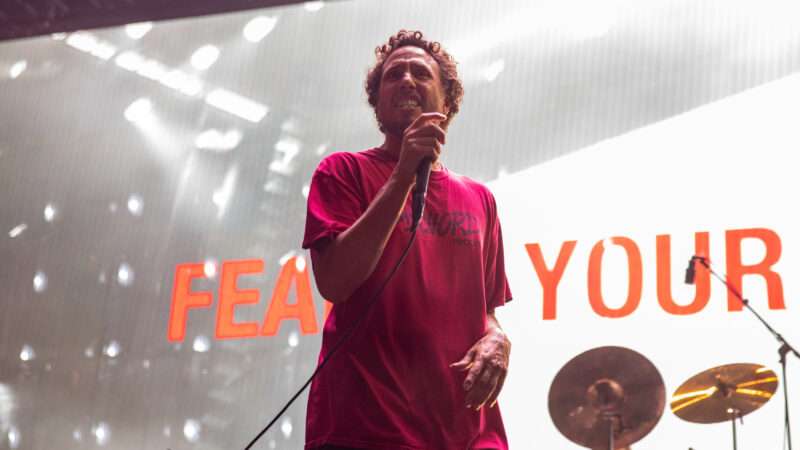
After two years of pandemic protocols, precautions, and prohibitions, Rage Against the Machine finally took the stage in Washington, D.C., for a long-anticipated, much-delayed reunion tour to shout fuck you, I won't do what you tell me.
At back-to-back concerts in a packed Capital One Arena, rock's most radical band reinforced just how enduring its musical appeal is while adding a layer of awkward irony to the ideological project that runs through its lyrics.
Filling up a 20,000-person arena in a city where COVID fears still have people wearing masks outside is no mean feat—particularly when the cheapest tickets cost just under $200. It's doubly impressive for a band that hasn't released a full-length album of original material this century.
Rage's Tuesday night show provided ample evidence for why people turned out. It was a tight, energetic performance one might have expected of a band half its age. The lack of new material didn't matter much to an audience eager to rap along to well-worn classics like "Take the Power Back," "Know Your Enemy," and "Testify."
But if its music and performance have managed to stay fresh, Rage's message can't help but feel rather stale and ordinary, given how politics has shaken out since its heyday—and particularly over the past couple years that its reunion tour has been delayed.
The lyrical themes of Rage Against the Machine are a whirlwind of historical references and contemporary 1990s polemics—a merger of old-school hippie paranoia about the security state ("Hoover, he was a body remover") with fresher attacks on an American-led post–Cold War order ("NAFTA comin' with tha new disaster").
Tying it all together is a rejection of "the system" itself as racist, exploitative, and inherently oppressive ("some of those that work forces are the same that burn crosses"). Its broadsides against the FBI and U.S. foreign policy will easily resonate with libertarians. The attacks against consumerism and free trade won't.
Viewed in the context of the decade in which the band was made, there was something refreshingly fun and nonpartisan about these attacks on a "machine" whose oppressive nature didn't change all that much from Ronald Reagan to Bill Clinton.
But keeping this all fresh and distinctive has been a challenge. That's partly because many of Rage's once radical ideas have become basically mainstream.
Attacking globalization was a little bolder in the 1990s when Democrats and Republicans were largely supported it. Rage guitarist Tom Morello's headlining of the 2016 "Rock against the TPP (Trans-Pacific Partnership)" tour was less courageous when one considers that Hillary Clinton and Donald Trump both also came out against that modest free trade agreement.
Similarly, the band provoked cheers when it flashed an "abort the Supreme Court" text on a massive screen at Tuesday's D.C. show. One likely could have gotten the same message by turning on MSNBC.
The fading distinctiveness of Rage's brand of politics is less disappointing than the band's failure to apply its message of radical nonconformity to the issue of the past two years.
The COVID-19 pandemic has been one long series of the machine telling people what to do, from staying inside and social distancing, to wearing masks, to getting vaccinated. Rage Against the Machine has been conspicuously silent about all that.
I'm not aware of any band members going so far as to endorse lockdowns or other pandemic measures. Morello seemed to criticize mandates in 2020 when responding on Twitter to the hilarious rumor that the band would help President Joe Biden promote mask wearing and social distancing. But he was also incredibly dismissive of the idea that anyone would do anything but listen to the Centers for Disease Control and Prevention and isolate themselves.
It's possible for radical leftists to think COVID-19 restrictions were a prudent, effective means of controlling a deadly virus. Perhaps the system got that one right. But if it can be trusted to largely call pandemic policy correctly, what's left of the radical critique that the machine's very existence is intolerable exploitation? If we can trust the man to implement a stay-at-home order, do we really need the revolution?
It's a question a lot of the radical left in America have been struggling to answer throughout the pandemic. Their basic approach to COVID-19 was not all that different from the elite consensus of paying people to stay home and wait out the virus. The original anti-lockdown protests were an almost exclusively right-wing affair. And when leftists did dispense with pandemic protocols during the George Floyd protests of summer 2020, mainstream liberals largely nodded in agreement.
It's a similar story with rock music generally. Except for some old fogies with a history of right-wing politicking (like Eric Clapton), once rebellious musicians seem to have largely accepted pandemic restrictions that made so much of their industry illegal. Even when the fans were ready to ditch their masks, some performers demanded the crowds keep them on.
If radical left-wing politics and rock music have both largely accepted the COVID-19 security state, I suppose it shouldn't be too surprising that the band that's best fused both has as well. It doesn't make its music any less amazing, even if it does deflate the seriousness of its message.
The post After 2 Years of Silent COVID Compliance, Rage Against the Machine Returns appeared first on Reason.com.







